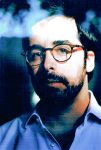I was given wealth,
but not told what to do with it
Levgueni Levtuchenko
At my age, my father was already an honourable man;
my grandfather was in the merchant navy,
he occasionally fired one or two rockets
towards dry land in homage to his love for a woman
whom he had met before my grandmother and who
would have given me blue eyes and far fewer problems.
Aged eighteen my parents took part in the Revolution.
And so did my grandfather. He was forty five.
Then my parents got married giving as an excuse the cycle of life,
the country that seemed on a good path, the house not quite yet .
My grandfather had once wanted to be an actor, after having spent
five days and four nights translating a play by Brecht
in a room of the Rosa hotel with a view over the river Sado.
Then my brother was born, his eyes – a widely acknowledged
fact – just like my mother’s.
I was born afterwards and later on, my sister, with Warsaw eyes,
not as honourable as they were beautiful.
I was born in what was still Portugal, but not my sister, she was born in the EEC,
which in the meantime had taught my mother and my father to be
even more perfectionist in the business of being honourable.
My grandfather was still translating Brecht and mistrusted
the CAP and all that could be encapsulated
in only three letters.
For him, the bare minimum was four.
They fucked me up, my mum and dad
and worst of all, they did it so that I could reach
twenty three years of age and be able to say already I’m an honourable man
like my father has been, unlike my grandfather
who would rather prefer Brecht than the plain commercial logic
of this brand new Portuguese love.
And even worse still, I’m now twenty three
and liable to become an honourable man.
© Translated by Ana Hudson, 2010
Bem-vindo aos anos zero
deram-me a riqueza,
mas não me disseram o que fazer com ela
Levgueni Levtuchenko
Com a minha idade, o meu pai já era um homem honrado,
o meu avô trabalhava na marinha mercante,
disparava ocasionalmente um ou dois foguetes
em direcção a terra seca, em homenagem ao amor de uma mulher
que conheceu antes da minha avó e que me teria dado
olhos azuis e muito menos problemas.
Aos dezoito anos os meus pais participaram na Revolução.
O meu avô também. Tinha quarenta e cinco.
Depois os meus pais casaram, desculparam-se com o ciclo da vida,
o país parecia estar no bom caminho, a casa ainda não.
Quis ser actor o meu avô, depois de ter passado
cinco dias e quatro noites a traduzir uma peça de Brecht
num quarto da pensão Rosa com vista para o rio Sado.
Então nasceu o meu irmão com os olhos que – toda a gente
confirmava – eram iguaizinhos aos da minha mãe.
Depois nasci eu e depois a minha irmã, com olhos de Varsóvia,
não tão honrados quanto belos.
Eu ainda nasci em Portugal, a minha irmã já não, nasceu na CEE,
que entretanto tinha ensinado a minha mãe e o meu pai a serem
ainda mais perfeccionistas nisso de serem honrados.
O meu avô continuava a traduzir Brecht e desconfiava
da PAC e de tudo aquilo que pudesse ser formulado
apenas em três letras.
Para ele, no mínimo, eram necessárias quatro.
Foderam-me a vida, o meu pai e a minha mãe,
e o pior é que o fizeram para que eu pudesse chegar
aos vinte e três anos e dizer que já sou um homem honrado,
tal como o meu pai tem sido, ao contrário do meu avô,
que prefere Brecht à linear organização comercial
do novíssimo amor português.
E pior ainda é que tenho vinte e três anos
e corro o risco de já ser um homem honrado.
In Criatura nº 4, 2009
